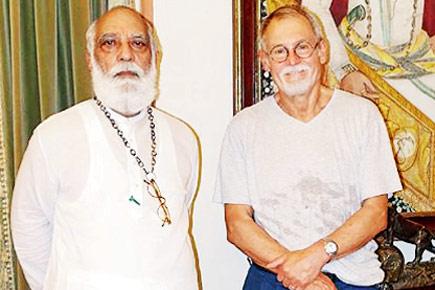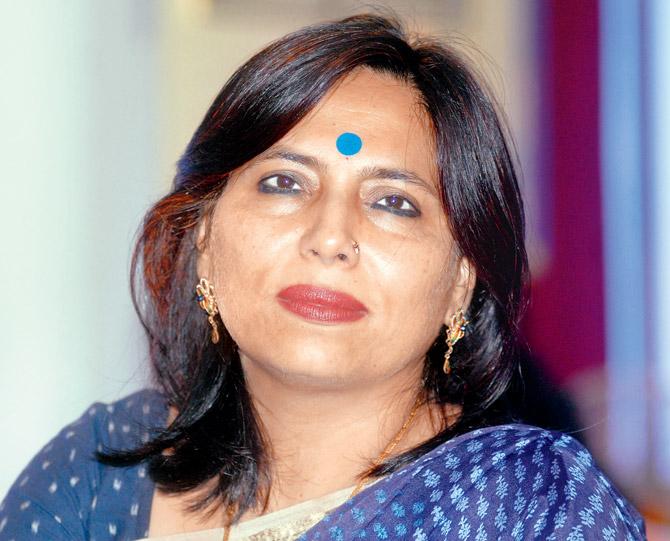Who would have imagined that a story about a marble producer in Udaipur, albeit a renowned one, would lead to another more intriguing one of an amorous one-eyed former KGB agent and a Greek shipping heiress?


Erstwhile Maharana Arvind Singh and architect Doug Patterson in Udaipur
ADVERTISEMENT
Who would have imagined that a story about a marble producer in Udaipur, albeit a renowned one, would lead to another more intriguing one of an amorous one-eyed former KGB agent and a Greek shipping heiress?
When our friend, the erstwhile Maharana of Udaipur, Arvind Singh, posted a photograph of himself this week with artist and architect Doug Patterson, of the Nile Studios in London, it was to narrate how the architect had revisited Udaipur recently, after his first trip in 1997. "He had come in search of a marble artefact for a great house in Mystic W.I. for Mr Sergei Kausov, a Russian businessman," says the Maharana. "At that time I introduced him to Ganpat Parihar for his project, which was later completed in 2000."
However, it turns out that the story did not end there. Kausov, a man with a colourful past, a former KGB agent who had the distinction of having swept the late Christina Onassis off her feet, marrying her when she was 26 and he 40, and divorcing her 16 months later (he received two oil tankers as part of his alimony), then sold the mansion to an American billionaire and moved to Morocco. Which is what led Patterson to return to Udaipur again, as the mansion's present owner re-engaged him to further expand the grand home in the same style. "He is now doing this with the assistance of Ganpat's son," says Singh. Incidentally, the marble works sourced from India had caught the imagination of the international press and have been described as 'a private palace to behold. Not only had Kausov planted fragrant gardens modelled after the Taj Mahal, but he's had Indian artisans replicating the artwork of the Kamasutra". The mind boggles.

Gautam Adani
Power equations
Even as he battles a slew of environmental protests, and legal and regulatory hurdles to get his ambitious $16.5 billion Carmichael mine and rail projects in central Queensland, Australia, off the ground, sources say Gautam Adani, chairman of Adani Enterprises Ltd, has an equally challenging issue back home, concerning his power plant at Mundra, Gujarat. "There has been so much insinuation of crony capitalism and his alleged proximity to PM Narendra Modi, that his power plant, which was seriously threatening the future of his business due to losses incurred through increased domestic levies on imported coal, is being closely watched as a test case by the industry," says a source. "At one time there was talk that the loss making plant would be bought over by the Gujarat government to bail out the beleaguered industrialist," adds the source. "However, given the high-profile nature of the case and the allegations of favoritism, it will not be possible to do this unless..." Unless? "Unless another loss making power plant in the same region, run by the Tatas, is also afforded the same privilege. Otherwise it will confirm the rumours," says the source, adding, "But as I said, it's such a high-profile case and all eyes are on it."
High-rolling regardless
Ever since word came in that the Reserve Bank of India has asked banks to initiate bankruptcy proceedings against a dozen of the biggest loan defaulters amongst Indian corporates, there has been considerable cheer that at last the guilty will be brought to book and justice will be done. As is known, there is a $150 billion unrecovered loan problem plaguing growth in Asia's third-largest economy, and this late but stringent act of rectitude on the part of authorities has been welcomed.
However, what is not as widely known is that out of the 12 high-profile and high-rolling defaulters, at least four are least affected by the latest move. "One is currently holidaying in Gstaad. The other is at the Bulgari Hotel in Milano as we speak, and two are in London enjoying the comforts of their sumptuous million dollar apartments," says an insider. Good Grief!

Indrani Mukerjea
A change of image?
The reports of barbarism and violence that have emerged from the Byculla women's prison recently have shocked the public.
Yesterday, Indrani Mukerjea testified that jail officials beat a woman prisoner to death last week, and attacked other inmates including herself. She showed injuries on her arms and legs as proof. Photographs of the erstwhile glamorous media magnate showing her to be gaunt and gray, speak of the effects of her harrowing experience. Could this impact the murder accused's own case for bail in any way? "The incident in the jail is totally unconnected with the trial of the case and bail considerations," says fiery lawyer Abha Singh, who has been following the case closely.

"All that this application made by Indrani on the alleged assault would hopefully result in is improving safeguards with respect to rights of prisoners within the jail premises," she says. Be that as it may, with her recent feisty championing of the rights of fellow inmates, there are many who feel that Mukerjea has scored important brownie points in changing her image from that of a criminal to that of a victim in the public's mind. Of course, murder trials are not decided in the courts of public opinion.

Abha Singh
"The jail incident, being an isolated matter, would not have any impact, either on her trial or on her application for bail," says Singh.

Sharmistha Ray
Raising feminist sons
"This salon emerged from the need to look at the causes of gender disparity in our country," says artist, writer, curator and TED fellow Sharmistha Ray about the 10th edition of Bellevue Salons, on the topic of 'Raising Feminist Sons,' to be held this evening at The Upstairs Studio in Bandra. Conceptualised, curated and arranged in partnership with Tara Kaushal (author of the soon to be published 'Why Indian men rape'), the salon brings together panelists Bishakha Datta, Vidya Kamat, Kiran Manral and Shilpa Phadke in a conversation moderated by Kaushal.
"This is not a parenting session though!" cautions Ray. "It's a look at gender disparity in our country, and how to collectively respond. From early development, boys in India are raised with a deep sense of entitlement."
As for the salons, a unique conversational platform that she has initiated in 2014, she says, "My impetus for them is to imagine a more egalitarian and utopian version of society through the eyes of an artist."
 Subscribe today by clicking the link and stay updated with the latest news!" Click here!
Subscribe today by clicking the link and stay updated with the latest news!" Click here!






